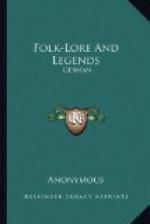“Just as he emerged from the wood, where a fine sloping bank, covered with short greensward, skirts the limit of the forest, his horse made a full pause, snorted, trembled, and started from side to side, stooped his head, erected his ears, and seemed to scrutinise every tree and bush. The rider, too, it may be imagined, gazed round and round, and peered warily into every suspicious-looking place. His dread of a supernatural visitation was not much allayed when he observed a female shape seated on the ground at the root of a huge old oak-tree, which stood in the centre of one of those patches of verdant sward, known by the name of ’fairy rings,’ and avoided by all peasants who wish to prosper. A long thin gleam of eastern daylight enabled him to examine accurately the being who, in this wild place and unusual hour, gave additional terror to this haunted spot. She was dressed in white from the neck to the knees; her arms, long and round and white, were perfectly bare; her head, uncovered, allowed her long hair to descend in ringlet succeeding ringlet, till the half of her person was nearly concealed in the fleece. Amidst the whole, her hands were constantly busy in shedding aside the tresses which interposed between her steady and uninterrupted gaze down a line of old road which wound among the hills to an ancient burial-ground.
“As the traveller continued to gaze, the figure suddenly rose, and, wringing the rain from her long locks, paced round and round the tree, chanting in a wild and melancholy manner an equally wild and delirious song.
The fairy oak of Corriewater.
The small bird’s head is under
its wing,
The deer sleeps
on the grass;
The moon comes out, and the stars
shine down,
The dew gleams
like the glass:
There is no sound in the world so
wide,
Save the sound
of the smitten brass,
With the merry cittern and the pipe
Of the fairies
as they pass.
But oh! the fire maun burn and burn,
And the hour is gone, and will never
return.




